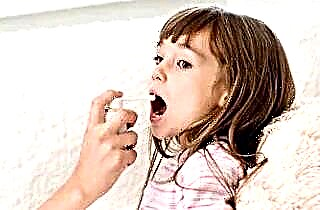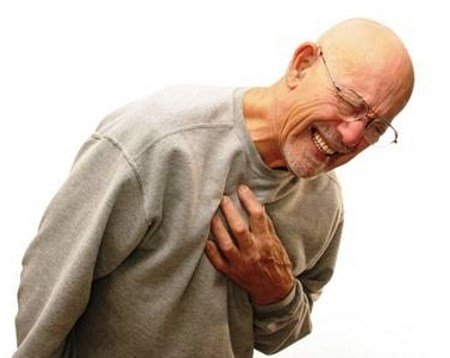Tonsillitis in children is one of the most common diseases. Children under 4-5 months of age cannot get sick with it, since their tonsils are just beginning to form. Up to 8 years old, sore throat mostly affects children with weakened immunity. The peak of childhood diseases with tonsillitis occurs in adolescence - 12-15 years, when the formation of the immune system is completed, and the tonsils begin to regularly perform their main function - to create a protective barrier against any infections.
Development mechanism
 Tonsillitis is an acute or chronic inflammation of the tonsils, in most cases of an infectious nature and only sometimes developing against the background of other respiratory diseases (sinusitis, rhinitis) or under the influence of systemic viruses (syphilis, herpes, etc.).
Tonsillitis is an acute or chronic inflammation of the tonsils, in most cases of an infectious nature and only sometimes developing against the background of other respiratory diseases (sinusitis, rhinitis) or under the influence of systemic viruses (syphilis, herpes, etc.).
The tonsils are the main barrier that protects the child's airways from the negative influences of the external environment. They are a physical barrier that manages to warm up cold water or air that has fallen into the throat, saving the bronchi and larynx from hypothermia. In addition, the tonsils are composed of lymphoid tissue and are part of the body's immune system.
The ingress of pathogens into the oral cavity stimulates an immediate response - the tonsils begin to produce cells that can neutralize uninvited guests. If the child's immunity is strong, then the body does an excellent job with this task, and everything is bypassed with a slight reddening of the throat.
But with insufficiently reliable internal protection, the tonsils cannot cope, and the pathogenic microflora actively multiplies on their surface. Moreover, some bacteria are capable of producing proteins that protect them from destruction and are toxins for the baby.
Therefore, the inflammatory process in the glands occurs against the background of general intoxication of the body, which further reduces immunity.
Factors provocateurs
With regular adherence to the rules of personal hygiene and preventive measures to prevent the development of respiratory diseases, children rarely get sick. But there is a number of provocative factors, in the presence of which, when pathogenic microorganisms enter the oral cavity, the development of tonsillitis becomes almost inevitable. Basically, this is everything that weakens the immune system and damages the mucous membranes of the nose and mouth:
 severe hypothermia: general or local (very cold drinks, ice cream);
severe hypothermia: general or local (very cold drinks, ice cream);- strong or prolonged stress, lack of sleep, inappropriate age regimen;
- too much workload at school and outside of it, chronic overwork;
- environmental problems: polluted or gassed air, water;
- poor-quality nutrition: excess of chemicals in products, vitamin deficiency;
- recent surgeries or illnesses: colds, acute respiratory viral infections, bronchitis, etc.;
- chronic diseases of internal organs: sinusitis, gastritis with high acidity, reflux, endocrine disorders.
But most often the trigger is the direct contact of the child with the carrier of the disease.
You can get sore throat by airborne droplets or through dishes, common items. In 90% of cases, the child "brings" sore throat home from a child care facility.
The main symptoms
Tonsillitis in children begins to manifest itself already in the first day after infection. Moreover, the child's condition worsens sharply, and not gradually, as with ARVI or colds. And the first characteristic symptom that gives reason to suspect a sore throat is a sore throat, accompanied by burning, tingling, soreness. Within a few hours, other signs of sore throat are obvious:
 spasmodic increase in body temperature up to 38.5OC and more;
spasmodic increase in body temperature up to 38.5OC and more;- a strong increase in the tonsils, their redness, looseness;
- sore throat makes it difficult to swallow and even breathing;
- the child becomes lethargic, physical weakness is noticeable;
- persistent headache and / or ear pain (sometimes radiating to the ear when swallowing);
- the lymph nodes are noticeably enlarged and hurt even with light pressure;
- signs of general intoxication: nausea, vomiting, dizziness.
Babies under 1.5 years old cannot complain of a sore throat, although they also have the symptoms of sore throat listed above. They often begin to cry, be capricious, behave unusually restlessly, or vice versa - become lethargic, lose interest in games. The child has a lot of saliva flowing from the mouth, as he cannot swallow it due to a sore throat. The kid, for the same reason, almost completely refuses to eat.
Self-medication in this case is not only useless, but also dangerous. First of all, it is necessary to establish the cause and causative agent of the disease, and this can be done for sure only with the help of laboratory tests.
Only a doctor has the right to prescribe antibiotics to a child - some of them can cause serious side effects and even lead to visual or hearing impairments.
Chronic tonsillitis in children is not so obvious, but if untreated, it can lead to extremely undesirable consequences. The main symptom of this form of the disease is the constant presence of a small amount of pus on the tonsils, frequent colds and sore throats 3-4 times a year. They are provoked by the focus of infection remaining after incorrect or not completed treatment.
The situation is aggravated by the fact that microbes quickly mutate and stop responding to previously used antibacterial drugs. Therefore, it is very important to complete the course of antibiotics, and not to interrupt it as soon as improvements are noticeable.
Treatment regimen
The general scheme for the treatment of acute angina exists, but the disease has several forms, each of which has its own characteristics. Therefore, the doctor should select medicines and paint the entire course, taking into account the age, condition and individual characteristics of the child.
The main elements of the therapeutic course are:
 regular rinsing of the throat or washing of the tonsils, which, with a large accumulation of pus or multiple boils on the tonsils, is done in the ENT doctor's office;
regular rinsing of the throat or washing of the tonsils, which, with a large accumulation of pus or multiple boils on the tonsils, is done in the ENT doctor's office;- treatment of the tonsils and mouth with antiseptic solutions to prevent the spread of infection;
- the use of topical preparations: sprays or lozenges with antibiotics;
- steam inhalations with soda solution, ready-made pharmaceutical preparations or herbal decoctions;
- home warming: compresses, rubbing, mustard plasters, blue lamp, solux, etc.;
- physiotherapy procedures: electrophoresis, UHF, quartz tube, sonophoresis, laser therapy, darsonval, bioptron, etc.
Usually, in addition to antibiotics (or antiviral drugs, depending on the identified pathogen), the child is prescribed anti-inflammatory, antipyretic (only at temperatures above 38OC), antihistamines and other medicines. And the main task of parents is to strictly observe the rules for their combination, the frequency of admission and the prescribed dosages.
With a properly organized course of therapy, a child's tonsillitis can be completely cured in 10-14 days.
But if you try to treat it only with folk remedies or do not follow medical recommendations, the disease can be delayed or become chronic, which eventually leads to the development of serious complications.
Possible complications
Chronic tonsillitis can cause complications already in the first year of the disease. Moreover, the younger the baby, the faster they appear. This is understandable - at an early age, some organs and systems are still being formed, the infection of which disrupts the process of their natural development.
 Chronic tonsillitis, if untreated, usually results in:
Chronic tonsillitis, if untreated, usually results in:
- acquired heart disease;
- kidney failure;
- rheumatism, rheumatic heart disease;
- arthrosis, arthritis;
- chronic bronchitis;
- exacerbations of eczema and psoriasis;
- inclusion of autoimmune diseases.
At the same time, chronic tonsillitis can be cured, if you approach it systematically and purposefully, in just 2-3 years. And the absence of exacerbations in the next 5 years will be proof that the problem has been completely resolved.
Surgical removal
If it is not possible to cope with the disease with conservative methods, and it continues to progress, giving exacerbations more often 4-5 times a year, despite all the preventive measures taken, then you have to act radically. The tonsils affected by the infection are simply removed surgically.
The operation is now considered an extreme measure, since the child is deprived of the natural protection of the respiratory system. She is appointed in such cases:
- a strong decrease in immunity, the child is constantly sick with something;
- complications caused by tonsillitis began to develop;
- overgrown tonsils interfere with normal swallowing of food and provoke apnea.
Before the operation, an additional examination is carried out to identify contraindications, which are blood clotting disorders, tuberculosis and other systemic infections, active inflammatory processes in the body.
 Modern methods of tonsil removal using high-tech devices (laser, ultrasonic, cryogenic) guarantee high accuracy and complete safety of the operation. It takes only a few minutes and is performed under local anesthesia.
Modern methods of tonsil removal using high-tech devices (laser, ultrasonic, cryogenic) guarantee high accuracy and complete safety of the operation. It takes only a few minutes and is performed under local anesthesia.
In a few hours, the child can go home and continue treatment on an outpatient basis. On the first day, there are many restrictions on food intake, but in two weeks the body is completely restored.
Only the attending physician who constantly monitors the child can make a decision on the appointment of an operation. The fact that you are tired of the constant treatment of chronic tonsillitis is not a reason to remove your tonsils. It will be much better for the child if it is possible to keep them. Therefore, you need to contact commercial clinics for the purpose of an operation only when it was prescribed by your doctor solely for medical reasons.
Prophylaxis
Prevention of tonsillitis in children is reduced primarily to strengthening the immune system. If the tonsils are able to independently destroy the microbes that have fallen on their surface, the child will cease to have sore throats. And the immunomodulators alone, which have become so fashionable to use today, are completely insufficient.
 In order for the defenses of the child's body to strengthen naturally, and not depend solely on the intake of stimulating drugs, a whole range of measures is needed: physiotherapy exercises, breathing exercises, hardening, vitamin therapy, high-quality nutrition and a properly organized daily regimen.
In order for the defenses of the child's body to strengthen naturally, and not depend solely on the intake of stimulating drugs, a whole range of measures is needed: physiotherapy exercises, breathing exercises, hardening, vitamin therapy, high-quality nutrition and a properly organized daily regimen.
It is equally important to teach the child to strictly adhere to the rules of personal hygiene: washing hands after each walk and before eating, using only your own towel and toothbrush, etc.
If a patient appears in the house, limit his contact with the baby as much as possible. During periods of outbreaks of massive respiratory diseases, avoid visiting places with a large number of people.
Fresh air is the best healer! You need to walk with your child in any weather, except too foggy or windy. In bad weather conditions, the walking time can be shortened. It is always necessary to dress the baby according to the temperature conditions - overheating is no less harmful for him than hypothermia.
Folk remedies: honey, herbal teas, lemon, vegetable and fruit juices are not only natural healers, but also excellent, and most importantly, useful means of preventing any disease. But if the baby is still infected or another exacerbation has begun, immediately go to the doctor and no self-medication!

 severe hypothermia: general or local (very cold drinks, ice cream);
severe hypothermia: general or local (very cold drinks, ice cream); spasmodic increase in body temperature up to 38.5OC and more;
spasmodic increase in body temperature up to 38.5OC and more; regular rinsing of the throat or washing of the tonsils, which, with a large accumulation of pus or multiple boils on the tonsils, is done in the ENT doctor's office;
regular rinsing of the throat or washing of the tonsils, which, with a large accumulation of pus or multiple boils on the tonsils, is done in the ENT doctor's office;

